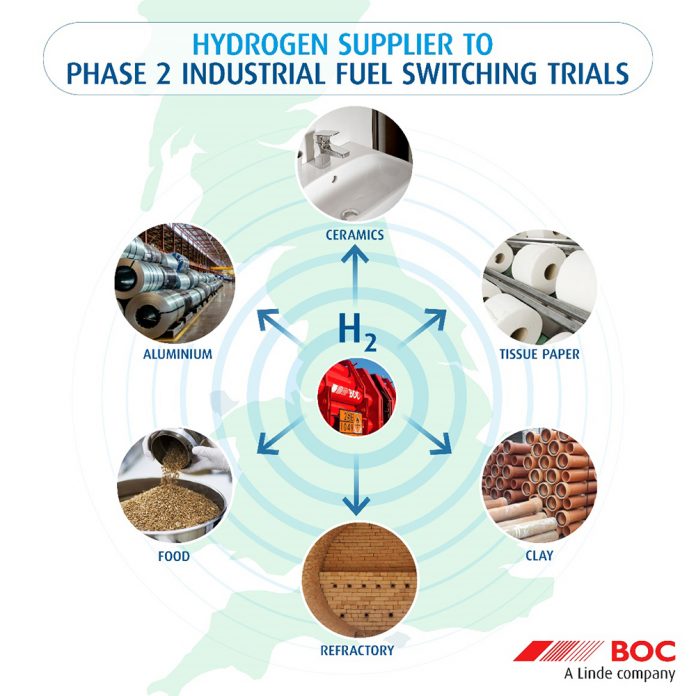Phase 2 of the government’s Industrial Fuel Switching (IFS) competition has begun, with BOC UK & Ireland named as preferred supplier of hydrogen for six special projects.
The competition aims to demonstrate the feasibility of fuel switching and enabling technologies, to help industry move away from high carbon fuels.
Having successfully proved the feasibility of hydrogen as a low-carbon alternative in the previous round, BOC – the UK’s largest hydrogen supplier – will support demonstration of fuel switch solutions for industrial processes on further industrial sites.
The projects are funded through the UK Government’s £55m Industrial Fuel Switching Competition, as part of the £1bn Net Zero Innovation Portfolio (NZIP).
In addition to supplying hydrogen, BOC will provide gas pressure control technology for industrial processes such as facilities recycling aluminium, and sites producing clay products, cereals and tissue paper.
Together with British Ceramics Confederation, BOC will work with Wavin Pipes, Ideal Standard and DSF Refractories; and, subject to contract, will also supply hydrogen for demonstration projects with Kellogg’s, Essity and Novelis, supported by Progressive Energy. First demonstrations are expected by the end of 2023, continuing into 2024.
These demonstrations represent a natural progression from the work demonstrated in the original IFS trials, in which BOC successfully delivered large scale hydrogen fuel switching demonstrations for projects with NSG Pilkington, Tarmac, Hanson and Unilever.
Wayne Bridger, of BOC UK & Ireland said: “From breakfast cereals to ceramics, these trials demonstrate the vital role for hydrogen-based decarbonisation across an even broader spectrum of UK industrial processes than ever before. Being the preferred supplier and operator of hydrogen in this key phase of the government’s competition, demonstrates BOC’s critical role in the drive to decarbonise UK industry.”
Emissions from UK industry account for 16% of UK Greenhouse Gases emissions – the third highest-emitting sector. Industrial decarbonisation remains a crucial piece of the puzzle in delivering net zero, and hydrogen represents the most viable solution to decarbonising many of the hard-to-abate industrial processes. These new demonstrations help to realise hydrogen’s potential across a broader range of industries.
With over a century of experience in producing hydrogen, BOC is well positioned to supply hydrogen to all six successful projects. BOC has a leading capability in the UK to decarbonise high temperature industrial processes using oxygen and hydrogen, which it can supply at scale.
Andrew McDermott, Deputy Chief Executive of the British Ceramic Confederation, said: “The funding of almost £6 million through the Industrial Fuel Switching Phase 2 Competition, as part of the £1bn Net Zero Innovation Portfolio, allows Phase 2 of the ‘Hydrogen for the Ceramics Sector’ project to progress. This is a vital project for UK ceramics and aims to demonstrate a key route to help decarbonise the sector. It will also provide a greater understanding about the use of hydrogen in an industrial setting that is capable of firing the vast array of ceramic products that are produced in the UK.”



